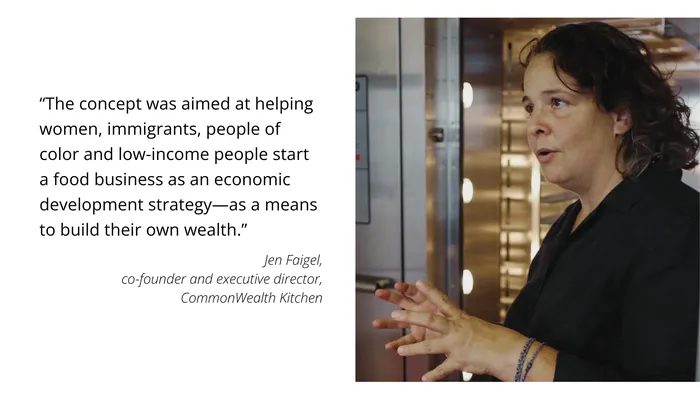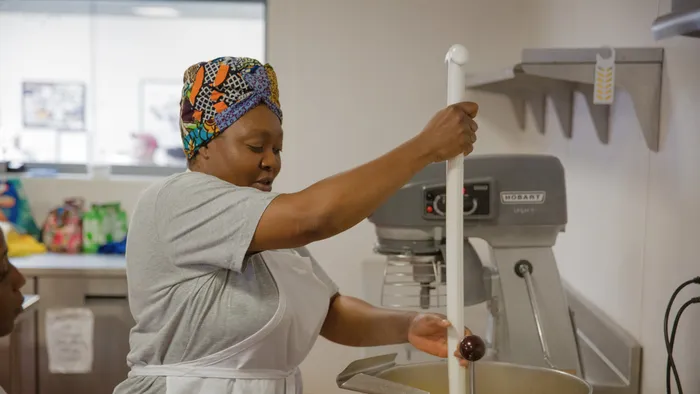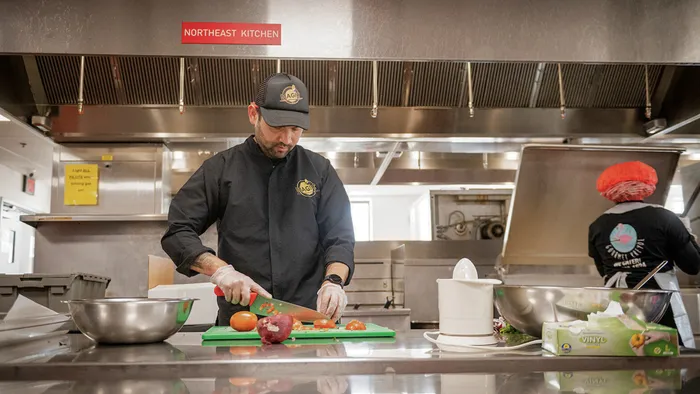Nonprofit CommonWealth Kitchen supports food business startups
While Jen Faigel, co-founder and chief executive of Common Wealth Kitchendescribes a non-profit food pantry and a shared kitchen model for a contract manufacturer, trying to make it as simple as possible.
“It’s like having a gym membership for your food business,” Faigel says. “Because you’re renting the kitchen by the hour.”
Based in the Dorchester neighborhood of Boston, Massachusetts, the nonprofit organization focuses on inclusive business aimed at growing small businesses in the food industry, including bakeries, food trucks, CPG companies and other. The shared kitchen offers six to seven stations within 14,000 square feet, including a large, multi-station kitchen designed for mass production. It has a walk-in closet-sized oven, with two racks that fit 44 sheet pans; isolation room with dehumidifier; dough sheet and small kettles; and cold chain manufacturing and packaging room.
“The idea was to help women, immigrants, people of color and people of color start a food business as an economic development strategy—as a way to create wealth,” Faigel said of CommonWealth Kitchen, which originally called Crop. Circle Kitchen. The non-profit organization, housed in a former hot dog factory, also provides storage, labeling and packaging, including packaging and sizing, for meat-free products. or seafood. Now, it works with 52 small businesses and about 20 farms—and about 85 percent are owned by women and people of color.
“The idea was that we could lower the barriers for people to start making money,” Faigel says. “The biggest challenge for anyone starting a food business is the cost of the kitchen.”

Unique model, customized support
When it started in 2010, CommonWealth Kitchen was one of the first organizations of its kind, according to the American Communities Trust.
“We were at the front of the air kitchen with everybody doing this,” says Faigel. “What we quickly saw was that [the] The kitchen is the easiest part because most people know how to cook, make food.” What is not easy for many entrepreneurs is understanding how to get the right approval, license or insurance, or knowing how to calculate costs, measure a recipe, make labels, know the shelf life of a product or buy package.
In terms of business support, many sites share tips on how to read a profit-and-loss statement or balance sheet, Faigel says, but not enough is provided about food industry information.
That prompted CommonWealth Kitchen, which now has 20 full-time employees, to develop educational training on topics such as market segmentation and industry-specific contract negotiations for supply, pricing and production. value. The program includes a 12-week “mini MBA” class for small food businesses through Babson College, Faigel says. Currently, the group is only open to businesses in the Northeast, Miami, Florida and Dallas, Texas.
Even with more training, many startups struggle to find marketability and can’t market, Faigel says. That’s a tough proposition if you’re starting out with a new product that’s unfamiliar to a large audience.
“The food industry is an industry where you don’t need fancy qualifications,” says Faigel. “English doesn’t have to be your first language, and you can have a criminal record – all things that prevent most people from making any kind of wealth in their lives,” he explains. Since Boston’s largest employers are colleges and hospitals, CommonWealth Kitchen has found a solution by connecting small business owners through partnerships with buyers and suppliers, including college and hospital food service programs. This includes the CommonWealth Kitchen Launchpad, a food court at the Massachusetts Institute of Technology student center.
“College students care about food,” says Faigel. And they love these stories about business owners. That helped Brands as well Hapi African Gourmeta sunflower and peanut soup company run by Paulette Ngachoko, a political refugee from Cameroon whose products have been on the lists of Harvard University, the University of Massachusetts and Boston College.
“It’s about creating strategic partnerships,” says Faigel.

Paulette Ngachoko, a political refugee from Cameroon, founded the Hapi African Gourmet brand, a sunflower and peanut sauce company.
Support for farmers, emerging CPG products
That’s helped by CommonWealth Kitchen’s ability to do co-packing on demand. “That means we’re going to do a lot of informal things, including a lot of work with farmers,” Faigel says. At least one-day supply for refrigerated items such as pickles, as well as frozen and shelf-stable products packaged in bulk for food service, or in glass and grocery bags. Although the production capacity depends on the product: For sauces, it can be 150 to 200 liters, Faigel says.
“We hear all the time from people in the CPG world that they’re stuck in this space where they can’t be a bigger package,” says Faigel. [artisan] and cultural package.”
CommonWealth Kitchen’s ability to be agile has helped when farmers have a large crop, such as tomatoes.
“They’re great fun, but they’re a lot,” says Faigel. Even food banks can’t take them because they will spoil. To avoid waste, CommonWealth Kitchen devised a few simple recipes to make a sustainable marinara. “We went to the farmers and said, ‘If you send us your extra tomatoes, we can turn them into marinara,'” Faigel says. “‘We’ll put your farm label on it, and you can sell it on your farm to make some extra money.’
Creating a holistic, 360-degree approach not only helps farmers, Faigel says, but also CommonWealth Kitchen’s network of small businesses, buyers and sellers, including large food service accounts that care about buy locally and sustainably.
“We will be processing the remaining 50 tons of local tomatoes that will go to Springfield Public Schools,” he says. “Now they’re going to get delicious local tomato sauce on their pizza.” Tomatoes will also be used at Boston’s Brigham and Women’s Hospital, on the patient menu and in the cafeteria, as well as at Harvard and MIT.
“We’re creating markets for things that would end up in compost at worst, and landfill at worst,” says Faigel. “We’re just connecting the dots.”

Edward Jerez founded Magic Empanadas, which serves Colombian empanadas at farmers markets and community events.
Spreading new opportunities
One of CommonWealth Kitchen’s latest projects is working with it Aurora Mills and Farm Linnaeus, Maine, and Clover Hill Farm In Gilbertville, Massachusetts, growing yellow field peas as a cover crop.
“We were asked to help develop other products as a way to encourage farmers to grow them and turn these crops into cash crops,” says Faigel. The move benefits the kitchen, the farmers and the land. Not only do green peas return nitrogen to the soil, which helps with greenhouse gas emissions and improves soil health, growing them also helps farmers save money because they don’t need to add as many chemicals to the soil. , Faigel says.
Yellow field peas are used to make falafel-like fritter sold at many colleges and hospitals, Faigel adds. They will also be sold to public schools in Boston and Maine this fall.
“I don’t know of anyone who does this type of direct integration the way we do it,” says Faigel. “We have a large number of people interested in this model who are trying to replicate it.”
#Nonprofit #CommonWealth #Kitchen #supports #food #business #startups